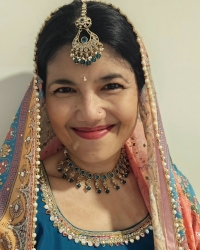Tamil (Hindu traditions) in Oman

Photo Source:
Anonymous
|
Send Joshua Project a map of this people group.
|
| People Name: | Tamil (Hindu traditions) |
| Country: | Oman |
| 10/40 Window: | Yes |
| Population: | 14,000 |
| World Population: | 3,640,000 |
| Primary Language: | Tamil |
| Primary Religion: | Hinduism |
| Christian Adherents: | 12.00 % |
| Evangelicals: | 2.00 % |
| Scripture: | Complete Bible |
| Ministry Resources: | Yes |
| Jesus Film: | Yes |
| Audio Recordings: | Yes |
| People Cluster: | South Asia Hindu - other |
| Affinity Bloc: | South Asian Peoples |
| Progress Level: |
|
Introduction / History
The homeland of the Tamil people is southeast India. Tamil is one of the major languages of India and the 17th most spoken language in the world. Tamils are proud of their cultural and literary heritage that dates back over 2000 years. Oman is the oldest national Arab state becoming independent from Persia in 1749. During the 19th and 20th centuries Oman was under the protection of the British Empire even though it was not an official colony. Many thousands of Tamils left India and live in dozens of countries throughout the world including Oman. Some migrated to Oman as indentured servants during the era of the British Empire. The ability of the Tamils to speak English and Arabic gives them an advantage in international business. The Tamils speak their own language at home, Arabic with their neighbors and English with tourists and foreign business associates. A small fraction of Tamils in Oman has become followers of Jesus Christ.
What Are Their Lives Like?
The Tamils who live in Oman are composed to two major groups. One group is made up of Tamils who have lived in Oman for generations. Many Tamils and other Indian came to Oman in the 19th century. They speak Arabic and are Omani citizens. Most of these Tamils work as middle class shop owners, managers, clerks, and restaurant workers in the growing Omani economy. Oil and natural gas are the main sources of income in Oman. Oman is one of the most stable Arab nations and has seen a sharp rise in tourism in the past few decades. Fishing and the farming of dates and coconuts contribute to the relatively high standard of living in Oman. The second by far the less fortunate Tamils work as temporary migrant laborers. They send any money home to their families in India. They cannot read and write Arabic and make only about $400 US dollars a month. These Tamil men and women do not plan to live permanently in Oman and are frequent victims of discrimination and abuse. The father is the head of the Tamil family. He shares leadership with his wife over the children. A woman has a higher place in the Tamil home than in most Asian and Middle Eastern cultures. Tamils in Oman try to maintain their ethnic identity and at the same time become model Omani citizens. In traditional Tamil culture, the parents chose the spouse of their children. This practice has changed in modern society where children frequently choose their partner with their parents' guidance. Parents strongly encourage their children to marry within their religion and people group.
What Are Their Beliefs?
The large majority of Tamils in Oman practice Hinduism, the ancient religion of India. The patron god of the Tamils is Murugan, the Hindu god of war. Hindus worship and serve the gods of the Hindu pantheon. Hindus believe that by performing rituals and good works that they will attain moksha or freedom from the endless cycle of birth, death and rebirth. The Tamils visit Hindu temples and offer prayers, food, flowers, and incense to their gods in hopes of gaining protection and benefits. They do not have a personal or familial relationship with their gods as Christians do with their heavenly Father. There are many forms of Hinduism, each with its own deities and beliefs. The Hindus in Oman try to be discrete in their religious practices because many Muslims see Hindus as idol worshippers. The main yearly holidays of the Hindu Tamil people are Holi, the festival of colors and the start of spring, Diwali, the festival of lights, Navratri, the celebration of autumn and Rama Navami, Rama's birthday. The Tamils in Oman also frequently celebrate Muslim holidays. The Tamil New Year is celebrated on April 14.
What Are Their Needs?
The Tamils in Oman need to understand that material success will not bring them the happiness they are seeking. Jesus Christ is much more than a Hindu god or guru. Only through Christ can a Tamil receive the forgiveness of his or her sins and the gift of eternal life. The Tamils who are temporary workers in Oman need access to things like basic medical care, decent shelter, clean water and food. Mission agencies can help these impoverished Tamils with their physical needs.
Prayer Points
Pray the Lord raises up a Disciple Making Movement among the Tamils in Oman in this decade. Pray the Lord moves believers and churches to reach out and share the good news with the Tamils. Pray that more Christian literature, internet material and videos are heeded by Tamil speakers. Ask God to bring Tamil leaders and heads of families into His kingdom.